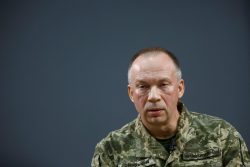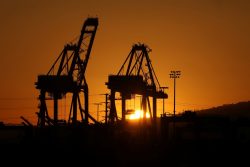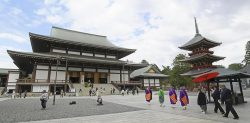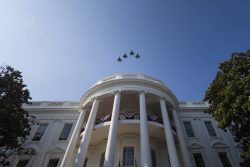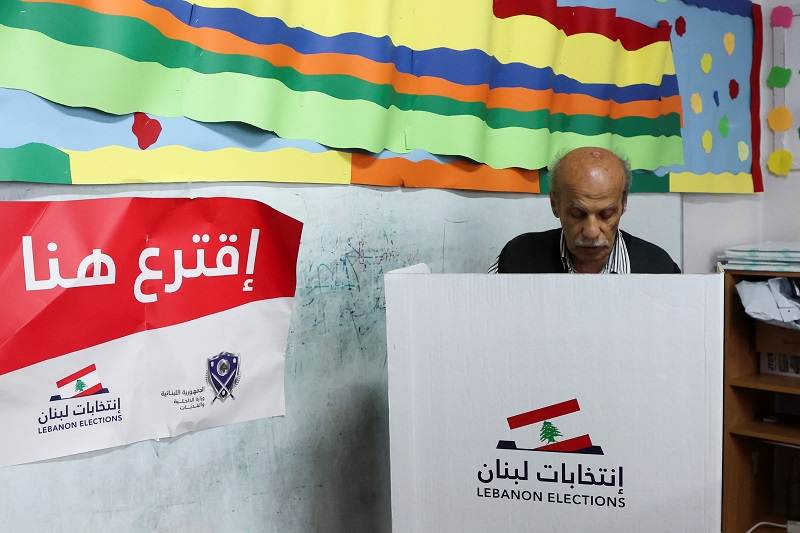
A man casts his vote at a polling station, during the parliamentary election, in Beirut, Lebanon May 15, 2022.
16:38 JST, May 15, 2022
BEIRUT (Reuters) – Lebanese voted on Sunday in the first parliamentary election since the country’s economic collapse, with many saying they hoped to deal a blow to ruling politicians they blame for the crisis even if the odds of major change appear slim.
The election, the first since 2018, is seen as a test of whether the heavily armed, Iran-backed Hezbollah and its allies can preserve their parliamentary majority amid soaring poverty and anger at parties in power.
Since Lebanon last voted, the country has been rocked by an economic meltdown that the World Bank has blamed on the ruling class, and by a massive explosion at Beirut’s port in 2020.
But while analysts believe public anger could help reform-minded candidates win some seats, expectations are low for a big shift in the balance of power, with Lebanon’s sectarian political system skewed in favor of established parties. Read full story
“Lebanon deserves better,” said Nabil Chaya, 57, voting with his father in Beirut.
“It’s not my right it’s my duty – and I think it makes a difference. There’s been an awakening by the people. Too little too late? Maybe, but people feel change is necessary.”
Fadi Ramadan, a 35-year-old voting for the first time, said he wanted to give a “slap to the political system” by picking an independent.
“If the political system wins, but only just, I consider that I would have won,” said Ramadan, casting his vote in Beirut.
In southern Lebanon, a political stronghold for the Shi’ite Hezbollah movement, Rana Gharib said she had lost her money in Lebanon’s financial collapse, but was still voting for the group.
“We vote for an ideology, not for money,” said Gharib, a woman in her thirties who was casting her vote in the village of Yater, crediting Hezbollah for driving Israeli forces from southern Lebanon in 2000.
Polls are due to close at 7:00 p.m. (1600 GMT), with unofficial results expected overnight.
IRAN’S ORBIT
The economic meltdown has marked Lebanon’s most destabilizing crisis since the 1975-90 civil war, sinking the currency by more than 90%, plunging about three-quarters of the population into poverty, and freezing savers out of their bank deposits.
The last vote in 2018 saw Hezbollah and its allies – including President Michel Aoun’s Free Patriotic Movement (FPM), a Christian party – win 71 out of parliament’s 128 seats.
Those results pulled Lebanon deeper into the orbit of Shi’ite Muslim-led Iran, marking a blow to the influence of Sunni Muslim-led Saudi Arabia.
Hezbollah has said it expects few changes from the make-up of the current parliament, though its opponents – including the Saudi-aligned Lebanese Forces, another Christian group – say they hope to scoop up seats from the FPM. Read full story
Adding a note of uncertainty, a boycott by Sunni leader Saad al-Hariri has left a vacuum that both Hezbollah allies and opponents are seeking to fill.
As the vote neared, watchdogs warned that candidates would purchase votes through food packages and fuel vouchers issued to families hit hard by the financial collapse.
Nationals over the age of 21 vote in their ancestral towns and villages, sometimes far from home.
The incoming parliament is expected to vote on long-delayed reforms required by the International Monetary Fund to unlock financial support to ease the crisis.
It is also due to elect a president to replace Aoun, whose term ends on Oct. 31.
Whatever the outcome, analysts say Lebanon could face a period of paralysis as factions barter over portfolios in a new power-sharing cabinet, a process that can take months.
Prime Minister Najib Mikati, a tycoon serving his third stint as premier, could be named to form the new government, sources from four factions have told Reuters.
Mikati said last week he was ready to return as premier if he was certain of a quick cabinet formation
Top Articles in News Services
-

Survey Shows False Election Info Perceived as True
-

Hong Kong Ex-Publisher Jimmy Lai’s Sentence Raises International Outcry as China Defends It
-

Japan’s Nikkei Stock Average Falls as US-Iran Tensions Unsettle Investors (UPDATE 1)
-

Japan’s Nikkei Stock Average Touches 58,000 as Yen, Jgbs Rally on Election Fallout (UPDATE 1)
-

Japan’s Nikkei Stock Average Rises on Tech Rally and Takaichi’s Spending Hopes (UPDATE 1)
JN ACCESS RANKING
-

Producer Behind Pop Group XG Arrested for Cocaine Possession
-

Japan PM Takaichi’s Cabinet Resigns en Masse
-

Man Infected with Measles Reportedly Dined at Restaurant in Tokyo Station
-

Israeli Ambassador to Japan Speaks about Japan’s Role in the Reconstruction of Gaza
-

Videos Plagiarized, Reposted with False Subtitles Claiming ‘Ryukyu Belongs to China’; Anti-China False Information Also Posted in Japan



